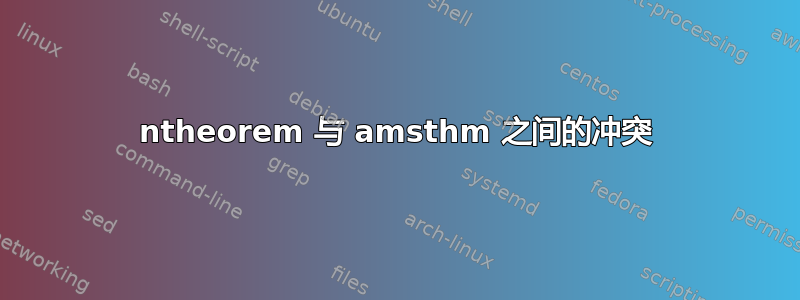
我正在使用etoolbox和ntheorem包来自定义定理和方程的编号。一切正常,但会出现以下错误:
\qedhere命令未知(编辑:根据一些建议,我找到了一些办法,所以\qedhere问题得到了解决)- 定理标题(可选参数)以粗体显示
作为 MWE,以下代码
\documentclass{book}
\usepackage{amsmath}
\usepackage{etoolbox}
\usepackage[amsmath,amsthm,framed,thmmarks]{ntheorem}
%
\renewcommand{\theequation}{\thechapter.\arabic{equation}}
\setcounter{equation}{0}
\newcounter{tempcounter}
\newtheorem{thm}{Theorem}[chapter]
%
\BeforeBeginEnvironment{thm}{\setcounter{tempcounter}{\arabic{equation}}}
\AtBeginEnvironment{thm}
{\setcounter{thm}{\thetempcounter}\subequations}
\AtEndEnvironment{thm}{\endsubequations}
%
\begin{document}
\chapter{This is a chapter}
\begin{equation}\label{Eq:A}
2+2=4
\end{equation}
\begin{thm}[First Theorem]\label{Thm:First}
\begin{equation}\label{Eq:B}
1+1=2
\end{equation}
\begin{proof}
If equation \ref{Eq:A} was trivial, equation \ref{Eq:B} in Theorem \ref{Thm:First} is even more \qedhere \\
trivial.
\end{proof}
\end{thm}
\end{document}
输出结果如下:

该\qedhere命令未知,因此被忽略。我认为问题是包amsthm中的选项与包之间存在冲突。但是,如果我添加序言,我会收到类似以下错误ntheoremamsthm\usepackage{amsthm}
! LaTeX Error: Command \theoremstyle already defined.
还有很多。
我想解决上面列出的两个问题,或者有替代代码以便:
- 定理和方程采用相同的编号,每章重新设置
- 定理环境中的方程按子编号排列,如上面的 MWE 输出所示。
任何其他建议都非常感谢。
答案1
该ntheorem包\qedhere以不同的方式覆盖。这里有一个您可以详细说明的示例。通过(重新)定义定理样式,可以轻松获得“正常字体属性”。
\documentclass{book}
\usepackage{amsmath,amssymb}
\usepackage{etoolbox}
\usepackage[amsmath,framed,thmmarks]{ntheorem}
%
\numberwithin{equation}{chapter}
\newcommand{\qedhere}{\ifmmode\qed\else\hfill\proofSymbol\fi}
\makeatletter
\renewtheoremstyle{plain}
{\item[\hskip\labelsep \theorem@headerfont ##1\ ##2\theorem@separator]}%
{\item[\hskip\labelsep \theorem@headerfont ##1\ ##2\ {\normalfont(##3)}\theorem@separator]}
\makeatother
\theoremstyle{plain}
\newtheorem{thm}{Theorem}[chapter]
\theoremstyle{nonumberplain}
\theoremheaderfont{\itshape}
\theorembodyfont{\normalfont}
\theoremsymbol{\ensuremath{\square}}
\newtheorem{proof}{Proof}
\qedsymbol{\ensuremath{\square}}
\newcounter{tempcounter}
\BeforeBeginEnvironment{thm}{\setcounter{tempcounter}{\arabic{equation}}}
\AtBeginEnvironment{thm}
{\setcounter{thm}{\thetempcounter}\subequations}
\AtEndEnvironment{thm}{\endsubequations}
%
\begin{document}
\chapter{This is a chapter}
\begin{equation}\label{Eq:A}
2+2=4
\end{equation}
\begin{thm}[First Theorem]\label{Thm:First}
\begin{equation}\label{Eq:B}
1+1=2
\end{equation}
\begin{proof}
If equation \ref{Eq:A} was trivial, equation \ref{Eq:B} in Theorem \ref{Thm:First} is even more
trivial.
\[ 0+0=0 \qedhere\]
\end{proof}
\end{thm}
\begin{thm}[Second Theorem]\label{Thm:Second}
\begin{equation}\label{Eq:C}
1+1=2
\end{equation}
\begin{proof}
If equation \ref{Eq:A} was trivial, equation \ref{Eq:C} in Theorem \ref{Thm:Second} is even more
trivial.
\end{proof}
\end{thm}
Let's see another proof.
\begin{proof}
\begin{itemize}
\item Fact one
\item Fact two
\item Fact three\qedhere
\end{itemize}
\end{proof}
\begin{proof}
Here the proof ends with an \texttt{align*} environment.
\begin{align*}
0&=0+0\\
1&=0+1\qedhere
\end{align*}
\end{proof}
\end{document}


